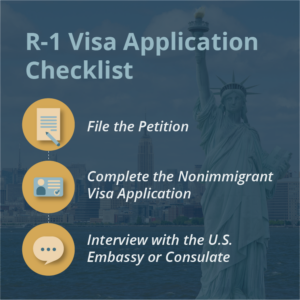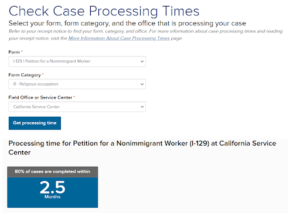
Everything You Need to Know About R-1 Visas
Are you planning to travel to the U.S. as a religious worker? If so, your best path forward is an R-1 visa.
The R-1 visa is a nonimmigrant, temporary work visa designed for foreign nationals who wish to work in the United States in religious occupations. This visa category applies to various types of religious workers, including but not limited to ministers, priests, religious educators, translators, and missionaries.
The Scott D. Pollock & Associates, P.C. team of immigration lawyers is committed to assisting religious workers worldwide in securing R-1 visas. And we are prepared to help you obtain a nonimmigrant visa for temporary religious work in the U.S.
R1-Visa Requirements
To qualify for an R1-Visa, the United States Citizenship and Immigration Services (USCIS) requires that foreign nationals and employers meet several criteria.
R1-Visa qualifications for individuals include the following:
- You must hold at least a two-year membership with a recognized religious denomination with a bona fide non-profit religious organization affiliation in the U.S.
- The same religious organization must offer you a U.S.-based job of at least 20 hours per week.
- You must solely serve as a clergy member or perform a religious occupation.
To be eligible to file petitions for R-1 visas, an organization must fall into one of these categories:
- A non-profit religious organization in the U.S.
- A religious organization authorized as a group tax exemption holder
- A non-profit religious organization affiliated with a religious denomination in the U.S.
How to Apply for an R-1 Visa
There are three parts to the R-1 visa application process: filing the petition, applying for a non-immigrant visa, and interviewing with the U.S. embassy or consulate.
 1. File the Petition
1. File the Petition
First, religious employers must complete Form I-129, Petition for a Nonimmigrant Worker. This documentation costs $460 (which the employer will pay) and requires proof of tax exemption.
In most cases, after receiving the petition, USCIS will conduct an on-site visit to confirm the relationship between the employer and the religious denomination.
The foreign national can begin the application process after the employer receives approval via Form I-797, Notice of Action.
2. Complete the Non-Immigrant Visa Application
All nonimmigrant visa applicants must fill out Form DS-160: Nonimmigrant Visa Application. This form includes several questions regarding their background and the purpose of their visit to the U.S.
There is no fee for submitting Form DS-160, Online Nonimmigrant Visa Application. However, some fees may apply depending on the relationship between the U.S. and the foreign national’s home country.
3. Interview with the U.S. Embassy or Consulate
Foreign nationals between the ages of 14 and 79 who apply for a nonimmigrant visa must interview with an official at the U.S. embassy or consulate in their home country or country of residence. To avoid long wait times, you should schedule an interview as soon as possible.
R-1 Visa Benefits
The key benefit of the R-1 visa is that it allows religious workers to work legally in the U.S. for a specific employer for up to five years. Additionally, spouses and unmarried children under the age of 21 are eligible to join the R-1 visa holder with an R-2 visa.
The U.S. doesn’t cap the number of R-1 visas, so you likely won’t wait as long as H1-B or H-2 nonimmigrant workers.
Finally, in certain circumstances, R-1 visa holders may be eligible to transition to other nonimmigrant or immigrant visa categories, which can provide alternate pathways to long-term residence or permanent residency in the United States.
R-1 Visa FAQs
The Chicago immigration legal team at Scott D. Pollock & Associates, P.C. is here to answer any questions you have about R-1 visas. Contact a member of our team today at 312.444.1940.
How Does the U.S. Government Define Religion?
USCIS defines a religious denomination as a group of people governed by a type of ecclesiastical administrative body.
In the context of the R-1 visa, the term “religion” includes theistic and non-theistic beliefs, as well as new and well-established religions. USCIS usually refrains from evaluating the validity of a particular religion.
Members of a religious denomination must also agree on at least one of the following criteria:
- A recognized statement of faith or shared beliefs
- A commonly held system of worship
- A commonly held doctrine and code of discipline
- Established places of worship and congregation
- An agreed-upon set of ceremonies and services
- Another comparable indication of a religious denomination
To satisfy these requirements, religious entities without a central governing or ecclesiastical administrative body may submit a description of their internal organizational structure.
What Are Religious Occupations?
Religious occupations include positions with duties primarily related to a traditional religious function: clergy members and other religious workers.
Eligible religious occupations include but are not limited to the following:
- Clergy: Ministers, priests, rabbis, salaried Buddhist monks, ordained deacons, etc.
- Other religious workers: Liturgical workers, instructors, counselors, missionaries, translators, broadcasters, cantors, etc.
USCIS does not consider workers with primarily administrative or support positions to fall under the category of religious occupations. For example, the following positions do not qualify for an R-1 visa:
- Maintenance workers
- Janitors
- Fundraisers
- Students
- Clerical employees
Volunteers are also not eligible for R-1 visas.
How Long Does It Take to Process an R-1 Visa?
The time required to process an R-1 visa can vary widely depending on several factors.
If USCIS has already conducted an on-site inspection of the religious employer, they may qualify for premium processing. Premium processing requires an additional $1,500 fee and should take 15 calendar days for most classifications.
If the religious employer is not eligible for premium processing, the process can take 8 or 9 months from start to finish. It can take the USCIS 6 months to respond to a petition and another 2-3 months for the visa to process.
However, the expected wait times can vary. You can use the USCIS processing times calculator to know what to expect. Currently, the processing time for Form I-129 is just 2.5 months.
How Long Does an R-1 Visa Last?
USCIS grants R-1 visas for up to 30 months. However, extensions for up to 60 months (5 years) are available.
Can I Apply for a Green Card as an R-1 Visa Holder?
Yes. R-1 visa holders can seek to become lawful permanent residents of the U.S. through methods such as adjustment of status, family sponsorship, or employment-based immigration visas for religious workers (EB-4 visas). You can apply for a green card after two years of R-1 visa status.
How Long Does an R-1 Visa Last?
USCIS grants R-1 visas for up to 30 months. However, extensions for up to 60 months (5 years) are available.
Can I Apply for a Green Card as an R-1 Visa Holder?
Yes. R-1 visa holders can seek to become lawful permanent residents of the U.S. through methods such as adjustment of status, family sponsorship, or employment-based immigration visas for religious workers (EB-4 visas). You can apply for a green card after two years of R-1 visa status.
What is The R-1 Visa Fee?
You or your employer must complete several forms for an R-1 visa. Each form has a different fee.
- Form I-129 – $460
- Form DS-160 – no fee
- Nonimmigrant visa fee – $205
- Biometrics (if required)- $85
What is the Difference Between R-1 and. R-2 Visas?
The United States offers the R-1 visa to religious workers, enabling them to work temporarily in religious occupations or roles. The R-2 visa allows the dependents of an R-1 visa holder (spouse and unmarried children under 21 years old)s to accompany or join the religious worker in the United States. While R-2 visa holders can study in the U.S., they cannot legally work.
Contact an Experienced Immigration Attorney Today
At Scott D. Pollock & Associates, P.C., we provide individuals, families, and employers the legal representation they need to navigate the process to obtain nonimmigrant visas, such as the R-1 visa.
Our attorneys have over seven decades of combined experience in U.S. immigration law. We’ve helped guide numerous clients through the complicated process of gaining temporary religious worker visas in the U.S.

 1. File the Petition
1. File the Petition
